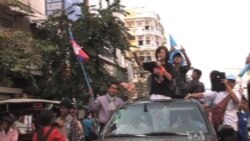PHNOM PENH —
Cambodia has banned anti-government demonstrators from holding protests after last week’s deadly clashes with police that left four people dead. But as striking garment workers vow to continue their vigil, and the political opposition keeps up its campaign against the government, many worry more conflict is likely.
With increasing frequency since July’s election, masses of protesters have publicly voiced dissent in Cambodia. Garment workers demand a doubling of the minimum wage. The opposition says the government rigged the last election. In each case, demonstrators are notably uncowed by state security forces.
“You see that people now, they are no longer afraid," said Sam Rainsy, chief of the opposition Cambodia National Rescue Party. "Of course, when they kill people, after a few days there's still some fear. But they cannot kill everybody, everywhere, all the time.”
Rights advocate Ou Virak says the dramatic change is partly due to age. Cambodia’s once war-weary public has been replaced by a younger generation more eager to assert and defend its rights.
“Well for one, it's just demographic shift," Virak said. "We have the post-Khmer Rouge generation. These are people who were born in the 1980s, who haven't lived much through the communist days. Many of these young people are more willing to challenge authority, willing to speak their mind. And young people are more ambitious.”
Amid the demographic changes, many of the country’s political players are older and criticized for being out of touch. Virak says that has led to a leadership gap for the government as well as the opposition.
“The two parties bring back all of the politics to things that they know, and therefore are comfortable with," he said. "But when they're looking at politics of the future, they're not comfortable with it. And they're not going to be happy in actually looking forward, where they're always happy to look backward.”
For the most part, the government had shown unusual restraint in dealing with the varied protests. That changed earlier this month when a mixture of garment strikes and opposition protests brought a heavy-handed reaction.
“This government, particularly Hun Sen, has been in power for decades," Virak said. "He knows how to fight wars, he knows how to be in armed battles, but he doesn't… They're not ready to deal with peaceful movements. And the sad reality of that part is that they only respond the way they know how, and that is turn it back into a warzone.”
For now, with the ban on protests, the capital city is quiet. But the opposition is regrouping in the provinces and says it's planning to hold rallies here once again.
With increasing frequency since July’s election, masses of protesters have publicly voiced dissent in Cambodia. Garment workers demand a doubling of the minimum wage. The opposition says the government rigged the last election. In each case, demonstrators are notably uncowed by state security forces.
“You see that people now, they are no longer afraid," said Sam Rainsy, chief of the opposition Cambodia National Rescue Party. "Of course, when they kill people, after a few days there's still some fear. But they cannot kill everybody, everywhere, all the time.”
Rights advocate Ou Virak says the dramatic change is partly due to age. Cambodia’s once war-weary public has been replaced by a younger generation more eager to assert and defend its rights.
“Well for one, it's just demographic shift," Virak said. "We have the post-Khmer Rouge generation. These are people who were born in the 1980s, who haven't lived much through the communist days. Many of these young people are more willing to challenge authority, willing to speak their mind. And young people are more ambitious.”
Amid the demographic changes, many of the country’s political players are older and criticized for being out of touch. Virak says that has led to a leadership gap for the government as well as the opposition.
“The two parties bring back all of the politics to things that they know, and therefore are comfortable with," he said. "But when they're looking at politics of the future, they're not comfortable with it. And they're not going to be happy in actually looking forward, where they're always happy to look backward.”
For the most part, the government had shown unusual restraint in dealing with the varied protests. That changed earlier this month when a mixture of garment strikes and opposition protests brought a heavy-handed reaction.
“This government, particularly Hun Sen, has been in power for decades," Virak said. "He knows how to fight wars, he knows how to be in armed battles, but he doesn't… They're not ready to deal with peaceful movements. And the sad reality of that part is that they only respond the way they know how, and that is turn it back into a warzone.”
For now, with the ban on protests, the capital city is quiet. But the opposition is regrouping in the provinces and says it's planning to hold rallies here once again.





